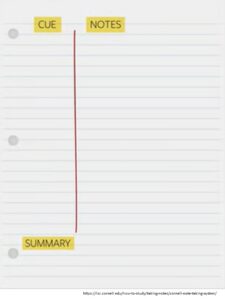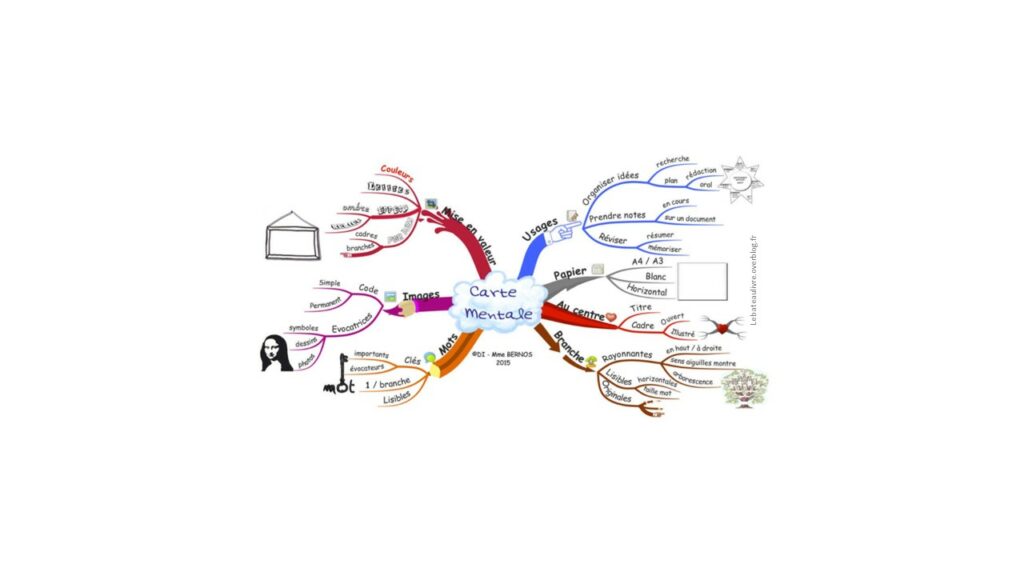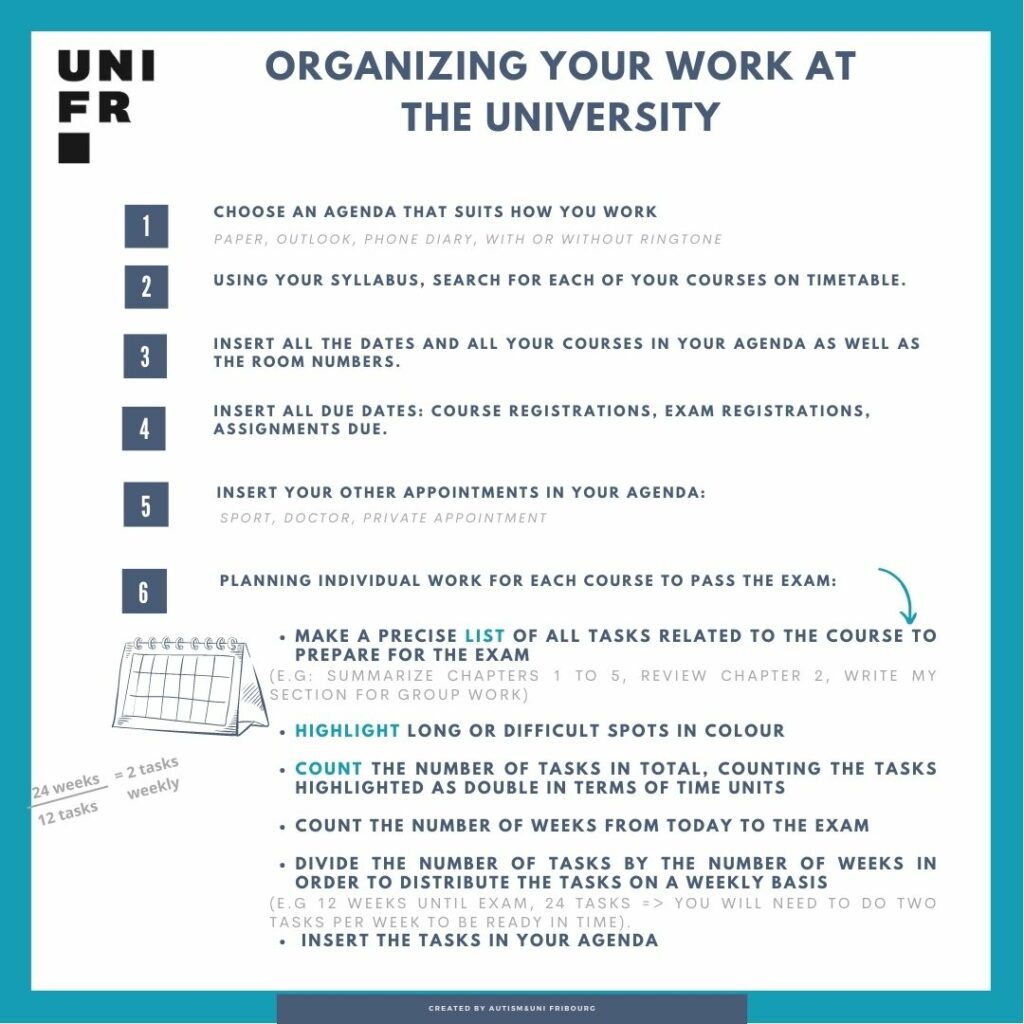Organization and note-taking are two key skills for smooth study. This chapter details how to improve on these skills.
Context
The lectures are given very differently from one teacher to another. Some lecturers give their materials in advance, which allows you to take notes directly on the pdf of the presentation, while others give the material after the lecture, or do not provide regular lecture material at all. Thus, students need to find a way to take notes efficiently, and then order those notes logically for easy retrieval.
Some students transcribe the entire course or copy their notes in full. This can make it easier to retain the material, but it is also a huge investment of time. A more pragmatic approach can save time without losing quality of learning.
In contrast to what usually happens for school exams, there is almost never an intermediate evaluation at the University. There is usually only one exam at the end of the semester or year to check all the learning that was done.
Most instructors will announce in the first class the learning objectives that you will be expected to master at the end of a course, i.e., the final summative evaluation (exam). This assessment may take the form of a thesis, a portfolio of work, a final presentation, or a written or oral exam. Assessment criteria are used to judge the quality of your work in relation to the stated learning outcomes. These criteria are usually communicated in advance.
You will usually have exams one to three times a year (in February, June or September). Many students find assessments and exams stressful. If you’re not sure how to interpret the learning objectives and assessment criteria, you can talk to the course leader.
Challenges for students can be:
- organising a revision timetable
- not being overwhelmed by all the course and reading material.
“I feel like I have to read absolutely everything on the course reading list, even if it takes years. I find it hard to revise only certain topics.” (Engineering student)
Whether it’s for classes, or individual reviews, you’ll benefit from finding a routine.
“I needed help to get organized for a big research job.”
(P., British student).
What does that have to do with me?
“It was difficult to hand in the work and assignments on time and to present the work in front of people.” (L., Finnish student)
Many students with autism have reported that one of the main challenges of exams is organizing review time over a longer period of time.
With coursework, the challenges can be similar: you need to organize your time so that you don’t have to rush things when the deadline approaches. You also need to know how to work on several assignments in the same period of time.
It really is helpful to develop learning strategies that allow you to have a pragmatic system. Organization will prove to be your most faithful ally.
What is the next step?
Read the evaluation criteria at the beginning of a project or course
Practical advice
Note taking:
- Develop your own abbreviations to save time when taking notes.
- Decide on a note-taking style that works regardless of the media type.
- Decide on a colour scheme, e.g., red for what is important, grey for examples, green for misunderstood elements, pink for exercices to do.
- If you are not annotating the pdf of the PowerPoint presentation directly, find a system to match the slide numbers with your notes. Ideally, the system should be the same for all courses. For example, take screenshots of the slide and write underneath.
- Copying the entire slide content is probably a waste of energy, unless this system allows you to concentrate better.
- Make an immediate note in your diary when a teacher announces deadlines for their course.
- At the beginning of each semester, it is imperative that you attend the first class, as this is often the time when the teacher explains his or her expectations and instructions. These clarifications allow you to estimate the amount of individual work that will be necessary.
- At the end of each lecture, make a short summary of a few key points (e.g., 5 or 6 bullet points) and try to write down a more personal sentence about your personal understanding of the course content. This will help you retain the material and develop your critical thinking skills.
- Some students find the Cornell note taking system very useful (Cornell note taking presentation)
Revision:
- Some teachers may record their lessons and share them on a platform such as Switch, Teams, Zoom or Moodle after the lesson. You cannot record a teacher without their explicit permission.
- After two or three weeks of classes, you will have a good understanding of the breadth of the material. Plan your revision around the exam date by dividing the material by the number of weeks available to you until then.
- Study in a place where you are not distracted. Put the things you need to study on your desk and put away all possible distractions.
- Try to identify activities that waste your time (e.g., social networking or video games) and minimize them without eliminating them completely (e.g., set aside an hour at the end of the day)
- Create routines to get you started on revising or writing assignments
- Even if you are more passionate about one subject rather than another, you must devote enough time to each subject
- Be careful not to invest too much time in subjects you are passionate about
- For review purposes, recording summaries in audio format is more suitable for people with hearing difficulties
- Mind mapping, done with software on your laptop or drawn by hand, can be a very useful way of showing how ideas are related and is well suited to visual people
Organization:
- Choose a calendar that suits your needs: paper, outlook, telephone calendar, with or without ringtone
- Using your syllabus, search for each of your courses on Timetable
- Insert all the dates of all your courses in your calendar
- Insert all due dates: course registrations, exam registrations, assignments due etc.
- Insert now the other appointments in your agenda: sport, doctor, private appointments etc.
- Task analysis: do a more detailed analysis for each course to quantify the individual work required to pass the exam. For each course, take a blank A4 sheet of paper:
- Make a specific list of all the tasks you need to do to prepare for the exam (e.g., summarize Chapters 1-5, review Chapter 1, review Chapter 2, write my section for the group assignment). The more specific you are in this list, the more effective the list will be
- Highlight long or difficult tasks in colour. They are worth double the number of time units
- Count the number of tasks in total, counting the highlighted tasks twice
- Count the number of weeks from today to the exam or due date
- Divide the number of tasks by the number of weeks in order to distribute the tasks on a weekly basis (for example, if you have 12 weeks left and your preparation includes 24 tasks, you will need to do two tasks per week to be ready on time)
- Insert tasks into your calendar
“Exams used to make me really flounder. I’d turn the page and my mind would go blank. Now I’ve realized that stress doesn’t really help me, and I do much better on exams.” (Bioscience student)
Questions to ask yourself
- Do I prefer to read documents on screen or on paper?
- What helps me focus on information presented orally when there is disruptive noise around me?
- Do I have a preferred seat in the room to follow the course in a concentrated manner?
- Is it more useful for me to listen to my summaries in audio format or to make visual mind maps of your ideas?
- What is my strategy for improving my work through feedback from others?
- Where can I find information about the evaluations?
- What are the dates and deadlines for submitting my work?
- Are the revision times clear to me (timing, content)?
Additional information
About the author
Edited by: Nathalie Quartenoud ©
Translated by: Daniel Dukes


 Back
Back 

